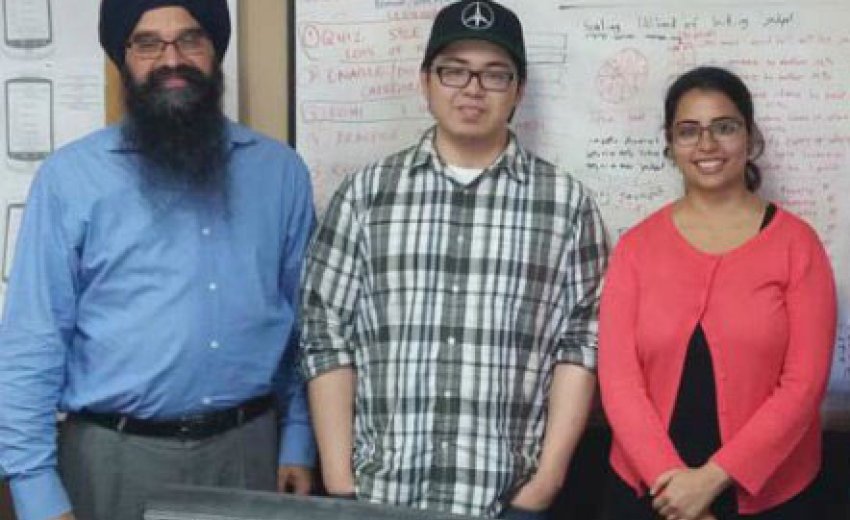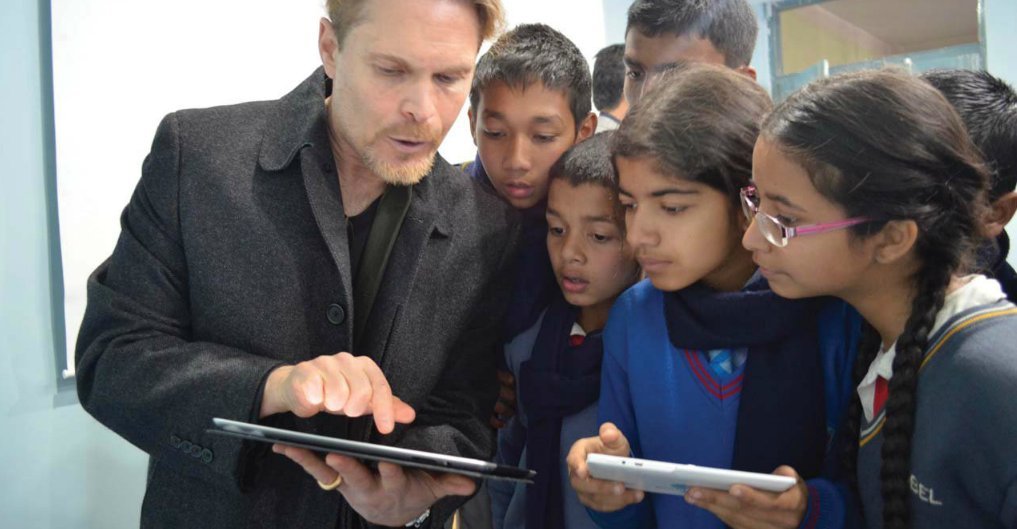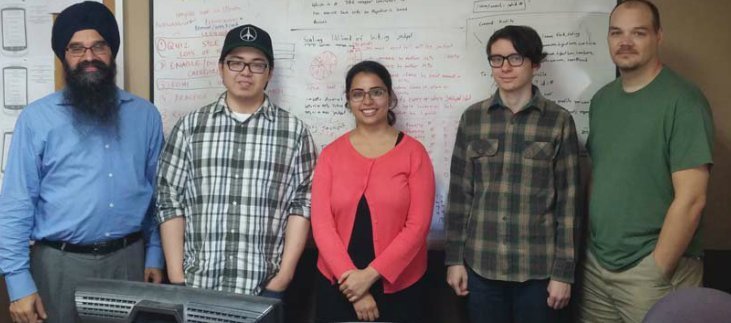and Their Challenge to Olympia
| ||
|
More than 7,000 miles away, children are in a small village school in India, children are learning math on hand held devices with "gamification" software developed by Pixatel out of the Thurston Chamber Small Business Incubator.
| ||
|
Pixatel’s founders, Prabhjot Singh and Jasmit Singh, have an unwavering vision: Help create a world where technology enables access to literacy and knowledge for everyone. Before Pixatel, Jasmit was leading the Professional Services Group for Mobile Technology at Qualcomm, and Prabhjot was Vice President of Marketing at CA Technologies. In their free-time they both volunteered for a non-profit, and that is where they met. They got to know each other and soon discovered that they shared similar goals and passions. “We both wanted to create a socially responsible, technology-focused start- up,” said Jasmit. They continued working at their full- time jobs, Prabhjot in San Francisco and Jasmit in San Diego, while regularly talking about how they could bring their vision to fruition. “Three and a half years back, we knew we had to jump in full-time. We quit our jobs and started brainstorming,” said Jasmit. That brainstorming led to Pixatel, a technology start-up that experienced a 500 percent revenue growth in the past year, with a mission of using technology to enable access to literacy and knowledge for everyone through the use of innovative applications and e-Learning. ‘We've been able to demonstrate that a company can focus on working to improve society and become a profitable enterprise at the same time, said Prabhjot. Pixatel has multiple locations. The development team is housed in the Thurston County Small Business Incubator and is run by Jasmit, who is Pixatel’s Chief Technology Officer. Prabhjot is based in San Mateo and is the company’s Chief Executive Officer. The company’s executive team includes Richard Shapiro, who heads Education and Public Policy. Pixatel also has a team in India to manage on the ground operations, as well as a growing presence in Nepal. The team is able to function at a high level because the senior-level staff communicates continuously. “Our senior management speaks with each other multiple times daily. Given we are distributed across various locations, we leverage email and a number of collaboration tools to ensure everyone is on the same page,” said Jasmit. |
Most of Pixatel’s solutions involve a term Jasmit uses a lot, and that word is gamification. “Gamification uses incentives such as rewards and badges to motivate users to continue playing and thus learning,” said Jasmit. “It is about leveraging the good in technology, and the idea that kids enjoy playing games.” In late 2013, Pixatel won a grant from the U.S. Agency for International Development to develop a cloud based e-learning platform. The grant supported development of a technology platform to improve the quality of education with a focus on basic numeracy and literacy. The platform’s computer-assisted learning caters to individual students by allowing them to learn according to their own ability and at their own pace. The result is software called Math Whiz, which teaches students basic math skills through a game-like interface in which students use Pixatel’s adaptive eLearning platform to advance through curriculum topics at their own pace while providing teachers with visibility on each student’s progress. | ||
| |||
|
"We recently went live in two schools in India,” said Jasmit. "The feedback from students, teachers and parents has been incredible. Kids are excited about doing math in their classes. It validated what we were thinking in our hearts and minds. “Our next challenge is to scale it to deploy the technology across thousands of schools. We are also considering how we can utilize the adaptive platform to help students learn how to read better. “We chose to develop an adaptive learning platform because no two kids learn the same way. Technology has impacted every aspect of our life from how we hail a cab to how we find a place to stay during a vacation but how we teach hasn’t changed much in the past hundred years,” said Prabhjot. “Countries like India have high student enrollment in school but poor quality of education. We’ve developed an adaptive platform that can tailor content based on each child’s level of learning and give teachers or administrators the visibility they need to ensure each child can be successful.” Faculty from Columbia University and University of Pennsylvania are partnering with Pixatel to evaluate the efficacy of the platform. Based on the results of the current deployment, Pixatel plans to iterate the solution and scale both across more schools and also make their solution available through Google Play and Apple’s App Store. “In addition to our work in India, it’s been gratifying to work with schools, universities and government bodies in Nepal to deploy e-Learning systems that will provide Nepal’s students with the same type of educational resources that are available to kids in America.” said Prabhjot. “Our goal is to utilize technology to democratize education so that all students gain access to literacy and knowledge, develop responsible citizenship, and become equipped to compete globally,” said Jasmit. Pixatel’s work has not been without challenges. “We’ve experienced phenomenal growth, but as with any startup, we are ahvays a little nervous. You are placing bets, and bets don’t always work,” said Jasmit. “One of the things we learned is that you can have great intentions, but translating vision to reality can be difficult. We had to actually work with schools to build classrooms in India. We also hired people to run the internet connection from town to the village. However, these things align with our mission - making technology accessible. Those are the things that make a difference.” |
Pixatel’s other challenge is closer to home - building a team of skilled software developers in Olympia. “We offer an intensive internship program to train recent graduates to develop the skills they need to further our work and become eligible for other great employment opportunities. We see a disconnect between what businesses need and what academia is currently offering so we took the initiative to develop the engineers we need,” said Jasmit. Pixatel’s development staff includes a graduate of Evergreen State College, two from University of Washington Tacoma and one from Saint Martin’s University. “When we hire graduates, we don’t just spend time training them. We give them a lot of responsibility, and then the time to learn by trying out new frameworks and technologies; discovering the need for innovation using the latest set of tools that make development agile and iterative," he said. Jasmit said he is committed to working with colleges to develop work-ready graduates, "I’m attending a conference at Green River Community College to talk about what skills we need to equip our students with so they can be successful in the industry. I also teach Android Technology at Highline Community College. I want to meet students who are excited about technology and how it continues to shape every aspect of our lives," he said. Jasmit also has another goal, and that is helping other tech companies locate to Thurston County. “My wife and I lived in the Bay Area before moving to Olympia. That was 14 years ago, and we haven’t regretted the move one single day,” said Jasmit. “People are attracted to the Pacific Northwest because of our belief in work-life balance as well as our social responsibility. We need to leverage that and attract technology at the same time, but we also need to bring people together to discuss technology, exchange ideas, and allow those ideas to percolate. “Technology plays a crucial role in our lives and can create impactful change for good. I would love to see technology events happening in Olympia that pull in the larger community, including students, parents, and educators. It is about collaboration and getting people together to talk about the exciting ways it can change lives for the better.” Natasha Ashenhurst is a freelance writer for the VOICE Magazine and can be contacted at [email protected] Thurston County Chanmber VOICE Nov/Dec 2014 | ||



